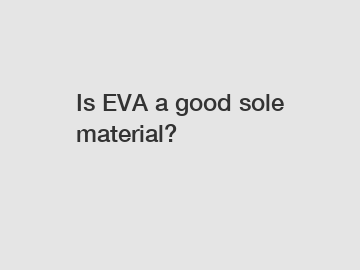Is EVA a good sole material?
Is EVA a good sole material?
When choosing footwear, one important factor to consider is the material used for the soles. The sole material plays a crucial role in determining the overall comfort, support, and durability of the shoe. One popular sole material that is widely used in the footwear industry is Ethylene Vinyl Acetate (EVA). In this article, we will explore the characteristics of EVA, its pros and cons, and whether it is a good choice for shoe soles.
What is EVA?

Ethylene Vinyl Acetate, commonly known as EVA, is a copolymer made by combining ethylene and vinyl acetate. It is a lightweight and flexible material that offers excellent cushioning properties. EVA is widely used in various industries, including footwear, due to its desirable qualities.
The Pros of EVA as a Sole Material.
1. Lightweight: One of the biggest advantages of EVA is its lightweight nature. Shoes with EVA soles are comfortable to wear as they do not burden the feet with unnecessary weight. This makes them ideal for long hours of walking or standing.
2. Cushioning: EVA provides exceptional cushioning and shock absorption, making it a preferred choice for athletic shoes, slippers, and sandals. The material softens the impact on the feet while walking or running, reducing the strain on joints and muscles.
3. Flexibility: EVA soles offer great flexibility, allowing for natural foot movements. This flexibility enhances the overall comfort and mobility of the wearer, reducing the risk of foot fatigue or injury.
4. Water and UV Resistance: EVA is water-resistant, which means it repels moisture and dries quickly. This quality makes it suitable for use in water shoes or outdoor footwear. Additionally, EVA is resistant to UV radiation, ensuring that the material does not degrade or yellow when exposed to sunlight.
The Cons of EVA as a Sole Material.
1. Durability: While EVA provides excellent cushioning, its durability may not match that of other sole materials. EVA has a tendency to compress and lose its cushioning properties over time, especially with frequent use. However, the durability can vary depending on the formulation and density of the EVA used.
2. Heat Sensitivity: EVA can be sensitive to high temperatures, causing it to soften or melt. Extreme heat, such as leaving shoes in a hot car or walking on hot surfaces, may pose a problem for EVA soles. However, this issue can be mitigated by using higher-density EVA, which has a higher melting point.
Is EVA a Good Sole Material?
Overall, EVA is a good choice for shoe soles in many situations. Its lightweight and cushioning properties make it comfortable for everyday use, as well as for athletic activities. The flexibility of EVA also enhances comfort and reduces the risk of foot fatigue. However, the durability of EVA soles may be a concern, especially for those who require long-lasting footwear. It is important to consider the specific needs and preferences of the wearer when deciding on the sole material.
If you would like more information about EVA as a sole material or have any other questions, please do not hesitate to contact us. Our knowledgeable team is always ready to assist you.
For more information, please visit pvc safety boots, wellington boots rubber, eva boots.
135
0
0


Comments
All Comments (0)